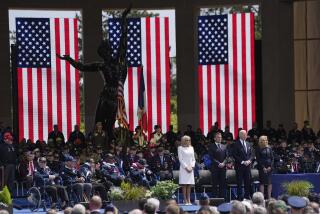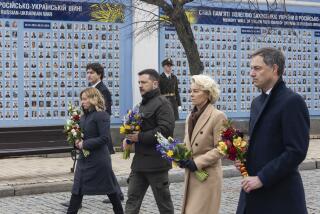Insurgent Attacks Continue 2 Years After the U.S. Invasion
BAGHDAD — Insurgents killed an Iraqi police officer Saturday and later bombed his funeral procession, killing three other policemen. The violence came as President Bush proclaimed that Iraq “is no longer a threat to the world” and tens of thousands of protesters abroad called for a withdrawal of foreign troops on the second anniversary of the U.S.-led invasion.
The roadside bombing in the northern city of Kirkuk was the latest to follow an increasingly common insurgent tactic of targeting funerals, and Iraqi security forces rather than U.S. troops. Police said the officer being buried had been sprayed by automatic weapons fire while driving to work.
One of those killed at the funeral was identified as a cousin of Jalal Talabani, a Kurdish leader who is expected to become Iraq’s next president.
Gunmen also killed a regional police commissioner on his way to his office in Baghdad. And 70 miles to the west, a suicide bomber blew himself up before his car reached its apparent target, a U.S. military patrol on a highway near Ramadi, the U.S. military said. No one other than the bomber was reported killed or injured.
The invasion that began March 19, 2003, toppled former President Saddam Hussein’s dictatorship but spawned a violent resistance. Led by elements of Hussein’s once-powerful Sunni Arab sect, the insurgency has killed more than 1,500 U.S. troops and about 1,300 soldiers and policemen serving the U.S.-backed Iraqi governments, officials say. Thousands of Iraqi civilians have been killed.
Iraq held no official commemoration Saturday of the U.S. invasion. But many Muslim clerics mentioned the anniversary in their Friday sermons while defending the insurgents.
“People have an internationally recognized right to defend their country,” Sheik Ahmed Taha Samarrai told worshipers in a Sunni district of Baghdad, adding that the insurgents should not target civilians who are their “Muslim brothers.”
Outside Iraq, some of the millions of people who marched two years ago against the invasion returned to the streets Saturday to protest the continuing bloodshed. News agencies said the numbers were significantly smaller: 45,000 in London, 15,000 in Istanbul, Turkey, 4,000 in Los Angeles and several thousand in New York. But their message was the same.
Protesters left a cardboard coffin outside the U.S. Embassy in London, a black wreath in front of the U.S. Consulate in Adana, Turkey, and outlines of bodies on the sidewalk by the U.S. Embassy in Athens.
President Bush used his weekly radio address to mark the anniversary. “We knew of Saddam Hussein’s record of aggression and support for terror,” he said. “We knew of his long history of pursuing, even using, weapons of mass destruction, and we know that Sept. 11 requires our country to think differently.
“Now, because we acted, Iraq’s government is no longer a threat to the world or its own people,” Bush added. He did not mention the failure to uncover chemical, biological or nuclear weapons here. He said the country’s recent election of a National Assembly was “inspiring democratic reformers” across the Middle East.
The president repeated the aim of bringing troops home once enough Iraqi security forces have been trained, but he gave no timetable.
Gen. Richard B. Myers, chairman of the Joint Chiefs of Staff, said Thursday that the insurgents’ ability to mount deadly attacks had weakened in the seven weeks since the election. Vice Adm. Lowell E. Jacoby, director of the Defense Intelligence Agency, told the Senate Armed Services Committee the same day that the number of insurgent attacks had diminished in that time from about 60 per day to about 50 per day, but he cautioned that “it is too early to say whether this is the trend.”
There has been no major insurgent attack since March 10, when a suicide bomber blew himself up outside a Shiite Muslim mosque in the northern city of Mosul, killing 47 people.
The violence has been aimed less at U.S. forces and more at the Shiites and Kurds who are filling the ranks of Iraq’s army and police forces and are expected to lead the government.
The Agence France-Presse news agency reported that seven Iraqis, including the five policemen, were killed in Saturday’s violence. No U.S. casualties were reported.
A previously unknown militant group, the National Movement of the Land of Two Rivers, claimed it had kidnapped two Egyptian engineers on a road west of Baghdad and was interrogating them to determine whether their work was “in the interest of the occupying troops or the new government.” The authenticity of the claim, made in a video posted online Saturday, could not be confirmed.
More than 200 foreigners have been kidnapped in Iraq since the invasion, and at least 30 have been killed. The latest to be freed was Minas Ibrahim Yousifi, an Iraqi-born Swede who had been abducted Jan. 28, two years after returning from exile in Sweden to form the Christian Democratic Party.
The 60-year-old politician told reporters Saturday that he was released after his captors became convinced of his support for the insurgency and dropped a $3-million ransom demand. He urged Bush to remove U.S. forces from the country.
More to Read
Sign up for Essential California
The most important California stories and recommendations in your inbox every morning.
You may occasionally receive promotional content from the Los Angeles Times.










